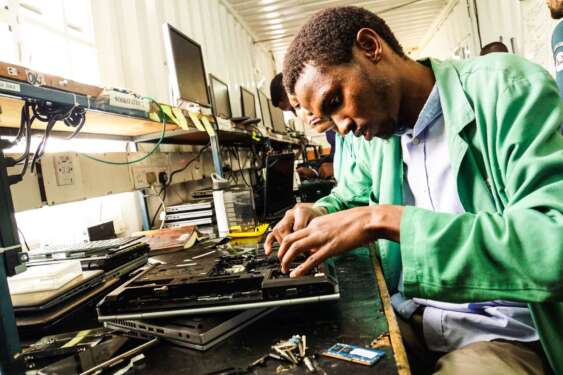According to the Global E-Waste Monitor Report, in 2019 the world generated 53.6 million metric tonnes (Mt) of electronic waste (e-waste), and only 17.4 per cent was recycled through appropriate channels. Africa in particular lacks formal governance to support e-waste management.
Households in Africa generated 2.9 Mt of e-waste in 2019, of which only 0.9 per cent was reported to be collected and recycled by the formal sector. Discarded equipment such as phones, laptops, fridges, sensors and televisions contain substances that pose serious environmental and public health risks, particularly if treated inadequately.
This is aggravated by the fact that not all the producers nor local authorities are taking sufficient ownership of this issue, and although e-waste volumes continue to rise, recycling facilities are not operating at capacity due to poor collection systems.
Most of these e-waste cases touch on waste generated from products used for data processing such as computers, computer devices like monitors, speakers, keyboards, printers as well as electronic devices used for entertainment like TVs, DVDs, and CD players. There is also increasing threat from equipment or devices used for communication like mobile phones.
There is now an emerging concern among investors who have over the years put their money in Off Grid System (OGS) on how such projects manage their e-waste in Africa.
“Through our investments, we have considerable exposure to the off-grid solar (OGS) sector, and we are also exposed to e-waste generation through other sectors, such as the manufacturing of white goods,” says Mark Eckstein, Director, ESG Impact CDC Group plc.
Though e-waste from the OGS sector represents a small fraction (roughly 7 per cent) of the total e-waste produced and the cost of treatment means that it is not economically feasible to recover, there is still concern on how this can be achieved effectively.
UK based CDC group has been funding ventures in Africa that promote sustainable energy on a consumer level with off grid networks. Such projects include Kenyan off-grid solar company M-KOPA, which has connected over one million customers in East Africa to lighting, smartphones, and energy-efficient appliances.
Read also: Kenya’s M-Kopa highlights how it has bridged the energy gap in East Africa(Opens in a new browser tab)
M-KOPA is aware of the increasing levels of electronic waste in households they serve and are committed to ensuring their work helps reduce e-waste. This is through establishing recollection and repair processes in place across a network of over 100 service centres and a centralised refurbishment hub.
“We will continue to play a central role in the off-grid e-waste dialogue, as committed active committee members of the GOGLA (Global Off Grid Lighting Association) most actively discussing the off-grid e-waste policies and regulatory landscapes,” said Danny Stoker, Head of Retail at M-KOPA.
In partnership with M-KOPA and sustainability firm Sofies, CDC Group undertook a survey of 500 M-KOPA customers between October 2019 and January 2020. The aim of the survey was to better understand how much e-waste – both off-grid solar and non-off-grid solar – could be found in consumer homes, how households manage their e-waste and how this issue can be addressed.
As expected, the survey found the prevalence of dysfunctional non-off-grid solar electronic products in households. This was attributed to the fact that a high percentage of customers live at a significant distance of 25km from shops, as well as to the intrinsic value of the electronic goods.
In Kenya, it is estimated that 65 per cent of products are retained in houses after they stop functioning.
The survey results also showed that the majority of respondents would not usually return e-waste to the seller. They planned to either keep the e-waste at home or use environmentally unfriendly solutions to dispose of the e-waste, including burning, burying or discarding the products locally.
The survey established that there was 25 per cent of water pumps, 24 per cent of radios and 15 per cent of cathode-ray tube (CRT) televisions.
Kenya already has formulated a legal framework that will soon be signed into law to help tackle the electronic waste (e-waste) challenge. Some of the proposals in the draft Bill include the formation of an electrical and electronic registry by the National Environment Management Authority (Nema) to capture amount and details of electrical equipment entering the country every year to curb the entry of low lifespan products.
CDC group notes that this data serves as the first step to realising a collection system that transitions a company from a linear to a circular economy model. The off-grid solar sector faces specific challenges as it serves mostly rural customers, where waste collection systems are often non-existent.
The volume of e-waste produced by the off-grid solar sector in isolation is limited, which challenges the economic sustainability of setting up a collection system. This highlights the need for a joint approach to waste collection across companies and sectors.
CDC further notes that proper management of e-waste can also be key to achieving ‘Circular Economy’ principles, which can be defined as a framework for an economy which is restorative and regenerative by design, in part by designing out waste and pollution and by keeping products and materials in use.
